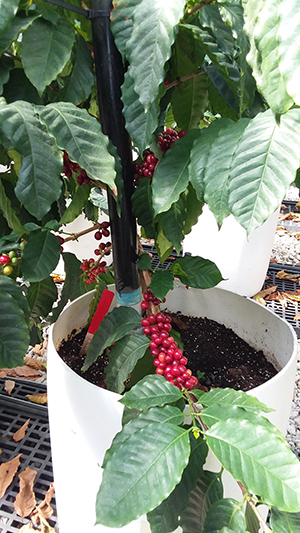Most of the world’s coffee is grown in tropical regions. However, a changing climate could allow coffee to grow farther north — for example, in Florida.
To understand how that might work, scientists with the University of Florida are already growing coffee plants at the UF/IFAS Plant Science Research and Education Unit, about 30 minutes south of the main UF campus in Gainesville.
A collaboration between the UF Herbert Wertheim College of Engineering and UF/IFAS, this project is funded by a grant from the USDA National Institute of Food and Agriculture.

“We believe that there is the potential for coffee as a novel crop in Florida,” said Diane Rowland, chair of the agronomy department and UF/IFAS’ research lead on the project.
“Coffee is a crop of global interest that is already facing major challenges due to climate change. At present, the world knows very little about coffee plant roots, their architectures and their function under climate change conditions. The roots are key points in this process,” Rowland said.
However, roots aren’t easy to study — and not just because they are underground.
“Most methods to study living roots ultimately involve destroying the roots or growing plants in a very artificial laboratory environment,” said Chris Wilson, assistant professor of agroecology in the agronomy department, and a member of the coffee research team. Stefan Gerber, associate professor in the soil and water science department, is also part of this team.
To understand how coffee grows in the field, the researchers are using minirhizotrons, clear plastic tubes with tiny cameras inside. The devices are placed underground alongside plants to record images of their roots.
Minirhizotrons collect so much information that it would take a very long time for someone to sift through it all, Rowland said.
That’s why the UF/IFAS scientists are collaborating with Alina Zare and Sanjeev Koppal in the College of Engineering to apply artificial intelligence and machine learning technology to improve and speed up that process.
Zare will develop artificial intelligence approaches to automatically process and understand the minirhizotron imagery. Koppal will develop new computer vision-based hyperspectral imaging systems to capture more information about the roots and the soil surrounding them than can be obtained from current minirhizotron systems.
This project is just one example of how UF researchers are using artificial intelligence to advance Florida’s agricultural sector. As part of the study, Zare said the researchers will use the HiPerGator 3.0 supercomputer to test the algorithms they develop for analyzing data from the minirhizotrons. The HiPerGator 3.0 is part of the $70 million partnership between Nvidia and UF and will lead to more of these AI-driven research projects across the university.
“Minirhizotron datasets are extremely large, require lots of image processing, and are fraught with tremendous measurement variability given the small apertures involved. All of these problems are amenable to machine learning approaches,” Rowland said. “We believe that current algorithms under development by our collaboration will be able to automate and accelerate substantial portions of data collection from minirhizotron data.”
Minirhizotrons will collect data from the coffee plants growing at the UF/IFAS Plant Science Research and Education Unit, where the researchers have planted coffee alongside existing citrus trees.
“Coffee is very sensitive to the cold, so our thought was to try to grow it with another tree that could shelter it. In addition, the citrus grove has freeze protection systems installed, so that could also protect the coffee,” Rowland said.
While the researchers are growing coffee alongside citrus for practical reasons right now, the combination could one day be economically advantageous, they said.
“As we thought more about it, we could also explore the combination of citrus and coffee as a possible cropping system in Florida — perhaps a future option the citrus growers might consider. This is a ways off — different questions and logistics would have to be worked out — but definitely worth exploring,” Wilson said.
The research team is growing Arabica coffee. Globally, Arabica is the most commonly grown variety and the most valuable one on the market.
In addition to investigating how their coffee plants’ roots perform, the researchers are also curious about how their Florida-grown coffee tastes. They are planning on roasting and brewing a test batch.
“Our research group has acquired a micro-batch precision coffee roaster. We are excited to try various roasting methods on the coffee beans we are producing,” Rowland said.
 0
0
